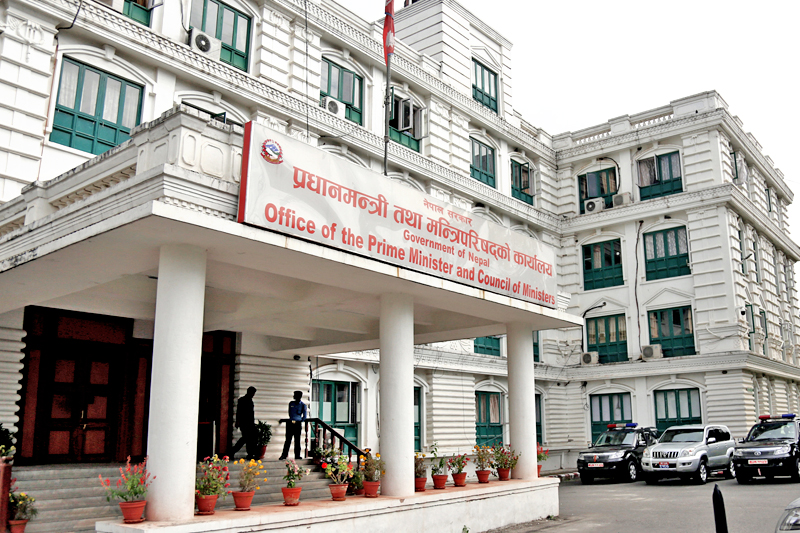OPMCM drafts National Integrity Policy
Kathmandu, April 25
The proposed National Integrity Policy drafted by the Office of the Prime Minister and Council of Ministers states that a person who became a member of a political party or who has been paying levy to a political party will not be eligible for constitutional posts, including judgeship.
Draft NIP states that a person recommended for constitutional posts must sign an affidavit before his/her appointment saying s/he was never a member of a political party and has never paid any levy to a political party.
The draft proposes that judiciary and constitutional bodies should not allow anyone to receive perks or facilities not sanctioned in the laws relating to pay and perks of constitutional bodies and the judiciary.
It also proposes that constitutional post holders cannot visit foreign countries without seeking consent of the government. Constitutional post holders should also inform the Ministry of Foreign Affairs if they have to visit foreign countries for private reasons. It states that the judiciary, constitutional bodies and security agencies should not receive assistance directly from I/NGOs. It also states that teachers cannot be associated with political parties.
It states that not more than one family member can remain in the executive body of an NGO and one person cannot hold the executive post for more than two terms. Moreover, public post holders cannot be in NGOs.
Guidelines for I/NGOs
- NGOs should not be involved in acts that could create hatred against Nepal or should not assist any INGO in spreading hatred or doing hateful things. Neither should they lobby for INGOs
- If any NGO comes to know that any foreigner or foreign agency is acting against the interest of Nepal or trying to create communal discord, then it should immediately inform the authorities
- INGOs cannot send any report to their countries without the consent of the Government of Nepal. They cannot spend more than specified amount under administrative and consultant headings
- INGOs will have to determine the number of foreigners working for them in Nepal and they cannot work against Nepal’s interests, culture and communal harmony
- INGOs cannot carry out activities to promote their religious, social or other agenda
- The affiliation or registration of INGOs working against the interests of Nepal will be cancelled
- Their registration will also be cancelled if they are found to be working as assistants of foreign embassies or religious organisations
- Foreign workers of INGOs will have to sign affidavits committing that they will not be involved in religious conversion, overtly or covertly.
- Foreigners working in INGOs will be deported if found to have worked against the interests of the country and could be barred from coming to Nepal again
Code of conduct for public post holders
- Public post holders, including elected members of the federal parliament, provincial assemblies and local levels, should disclose their property details within 60 days of assuming offices
- They should also disclose foreign and domestic tours they embark on and gifts they receive, besides any external job they do or contract they sign
- Office bearers of legislature cannot receive salary from places other than the government; nor can they hold other jobs






